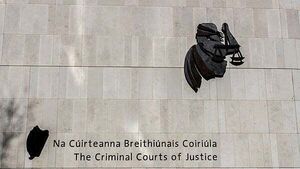Young mother was murdered 'in cold blood' at the hands of 'controlling' partner, court hears

Fiona Magennis
A young mother died as a result of a “sustained and brutal attack” at the hands of her “controlling and jealous” partner who murdered her “in cold blood”, stabbing her in the heart and attacking her "with such ferocity" that he severed a bone in her elbow, a prosecution barrister has told a jury at the Central Criminal Court.
Eilis Brennan SC, for the Director of Public Prosecutions, suggested lawyers for the accused man, Daniel Blanaru, were “throwing the kitchen sink at everything” without having “any particular plausible defence” to put before the jury.
However, defence senior counsel Giollaíosa Ó Lideadha, asked the jury to decide this case “in accordance with the evidence” rather than on “policy or prejudice or pre-conceived notions”.
Mr Blanaru (37), from Rathmore, Athboy, Co Meath, has pleaded not guilty to the murder of Larisa Serban (26) on or about August 12th, 2022.
In her closing speech to the jury on Friday, Ms Brennan said this was a very simple case which resolved itself to a few key facts.
“I say Daniel Blanaru murdered Larisa Seran and murdered her in cold blood,” she said.
“He attacked her with a knife, he beat her, he cut her. He stabbed her with such ferocity that he severed a bone in her elbow.’
She said Mr Blanaru had also stabbed the deceased in the chest, puncturing her lung and her heart, going through both sides of her aorta.
She said the evidence showed Ms Serban had numerous “defensive injuries” while Daniel Blanaru had “barely a nick on him”. “I maintain Larisa Serban sustained those injuries while she was trying to protect herself from an attack.”
Ms Brennan said there could be no doubt from the evidence of the pathologist and the evidence of the blood staining in the room that Ms Serban suffered “a sustained and brutal attack”.
Counsel said it is up to the jurors to decide whether they are satisfied that Daniel Blanaru carried out that attack.
“I suggest to you that if you are satisfied he carried out that attack, you will have no difficulty bringing in a verdict of murder,” she said.
Ms Brennan urged the jury not to get distracted by some of the “fanciful theories” floated by the defence and suggested the evidence in the case “all points one way”.
Counsel said Mr Blanaru appeared to be relying on three alternative defences, the first of which was that he does not accept that he killed Larisa Serban and that “possibly it was someone else”.
She said the second, based on what he told gardaí, was that there was a struggle where Ms Serban “came at him” with a knife and accidentally the knife “went into her”.
Counsel said it was her understanding that the third defence was that the deceased came at Mr Blanaru with a knife, and he was “trying to protect himself”.
Ms Brennan suggested that a “very high degree of mental gymnastics” was needed to reconcile each defence.
“It appears to me there is a certain element of throwing the kitchen sink at everything,” she said. “Shifting sands without having any particular plausible defence to put before you as a jury.”
Counsel contended Mr Blanaru was “controlling and jealous” and said evidence had been heard from Ms Serban’s parents in relation to separate threats he had made to kill his partner in the months before her death.
“The threats to kill, they are significant, and I think you should keep them in mind,” she said.
She said this “murderous attack” did not come out of the blue and had been “simmering for some time”.
Counsel said on Mr Blanaru’s account, at some stage on the night of the fatal incident there was a “tall unnamed Romanian mystery man in the house”. She said this man has never been identified and Ms Serban’s brother David gave evidence to say there was no one else in the house that night.
“That man, I suggest, is an invention in the mind of Daniel Blanaru,” she said.
Ms Brennan said the last messages from Larisa’s phone were sent at around 3.10am.
“I say that those messages were sent by Daniel Blanaru,” said counsel. “At this stage Larisa was dying or dead.” I say he left the house like a bat out of hell at that stage.” He was captured on CCTV soon after, she said.
Ms Brennan said once Mr Blanaru left the house, there was no more outward traffic on that phone. She said there was no attempt to call for an ambulance or for help of any kind.
Mr Blanaru drove to his sister Simona’s house in Drogheda, counsel said. She said Simona and her husband Raul told gardaí in their statements that when he arrived at their home, Mr Blanaru said he had killed Larisa.
She suggested that if Ms Serban had really “come at” Mr Blanaru with a knife, this would be the first thing he “would be shouting from the rooftops” when he came to his sister’s house.
Ms Brennan said the defence had “cast aspersions” on “the professionalism of absolutely everyone” who dealt with the accused, including gardaí, doctors, the translator and the member in charge.
The accused’s garda interviews were “rambling” and self-serving”, counsel said.
Counsel said the accused told gardaí that when he got to the house, Ms Serban was “partying” with a “tall guy” and her brother. She reminded the jury that a toxicology report showed there “wasn’t a trace of alcohol or drugs” in Ms Serban’s system.
In his fourth garda interview, as detectives are putting witness statements to him, Mr Blanaru said: “I am guilty, I killed her. Please lock me up”, said Ms Brennan. She said Mr Blanaru concedes that he was in the house and was involved in the knife going into Ms Serban’s chest.
Ms Brennan said State pathologist Heidi Okkers had given evidence of finding numerous incise wounds, abrasions and puncture wounds on the back of Ms Serban’s hands in keeping with defensive type injuries.
It was a “ludicrous proposition” to suggest that Ms Serban was partly injured in one attack and that someone then came back and carried out a second attack, counsel suggested.
Ms Brennan said the fact the accused had told Ms Serban’s parents that one day he would kill her showed his “murderous intent”.
In his closing address, Mr Ó Lideadha urged the jury to look at all the facts and decide this case “in accordance with the evidence” rather than on “policy or prejudice or pre-conceived notions”.
He said the suggestion by prosecution counsel that the messages sent from Ms Serban’s phone were in fact sent by Mr Blanaru was made without “any evidence to back it up”.
Mr Ó Lideadha said prosecuting counsel had said it was “ludicrous” to suggest the fatal blow could have been inflicted after Mr Blanaru left the scene.
Counsel said this ignored expert evidence in the trial in relation to blood splatter and the pathology evidence which, he said, suggested the wound to the arm could have occurred long before the injury to the chest.
There was no suggestion of any blood on the hands or under the nails of the accused, counsel said, and no blood in the car. Mr Ó Lideadha said the implications of the possibility of the involvement of somebody else was “simply not addressed”.
Counsel said all the objective independent evidence pointed to the likelihood that Daniel Blanaru did not inflict the fatal wound.
However, he said if the jury, having considered all the evidence, found that Mr Blanaru did inflict the fatal wound, they then had to look at the “concrete, independent evidence” on the question of accident and the question of self-defence.
He said if the jury accepted the description Mr Blanaru gave in interviews about what happened as “being reasonably possibly true” then there is an issue as to whether he intended to cause serious harm during that conflict.
“If there’s a reasonable possibility that the accused man honestly believed he was using reasonable force then the conviction is for manslaughter and not for murder,” he said, adding the jury could only convict Mr Blanaru of murder if they came to the conclusion that he used more force than was reasonable.
The trial continues on Monday before Ms Justice Eileen Creedon and an enlarged jury of 11 men and four women when Mr Ó Lideadha will continue his closing address.




